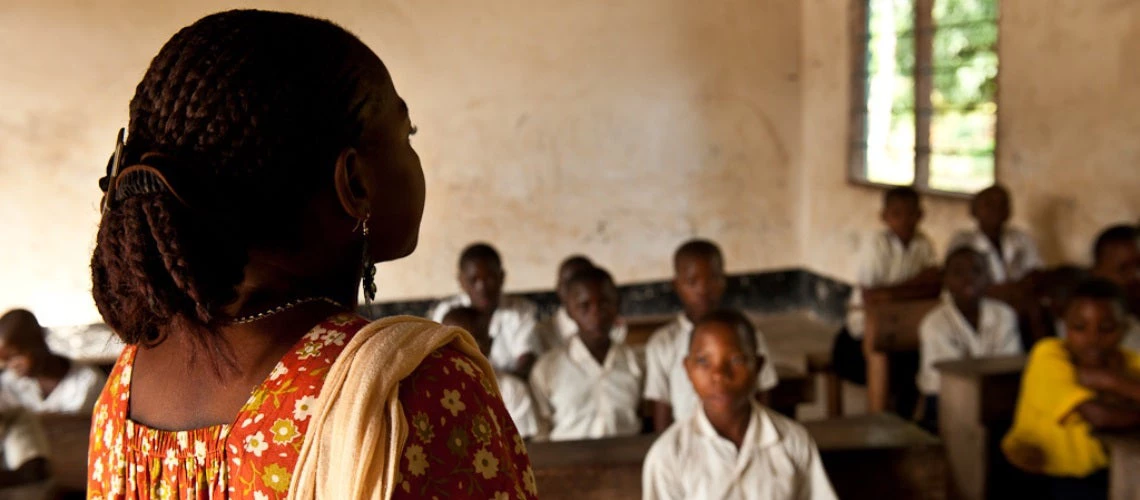 Education systems worldwide are beginning to introduce programs to address students’ mental health in schools. Copyright: Arne Hoel/World Bank
Education systems worldwide are beginning to introduce programs to address students’ mental health in schools. Copyright: Arne Hoel/World Bank
In the wake of the COVID-19 pandemic, a concerning trend has emerged that has captured the attention of educators, mental health professionals, and policymakers alike: a marked increase in depression and anxiety among young people that is strongly associated with poor learning outcomes and disengagement from school, especially among adolescents and from vulnerable and minority groups. This unsettling development has been accompanied by a concerning rise in school dropout rates, especially in low- and middle-income countries, raising critical questions about the long-term consequences for the educational and professional trajectories of the younger generation.
Mental health is a strong determinant of skills development and education outcomes
Depression and mental health issues, especially among youth, are closely associated with a cascade of challenges that can significantly hinder their educational and skills development process, ultimately contributing to lower learning outcomes, cognitive and socio-emotional skills stagnation, and an increased risk of school disengagement. The are several channels through which depression hinders education outcomes, such as:
- Decreased motivation, interest, and energy: Depressed individuals experience a lack of motivation and interest in activities, including schoolwork. This reduced enthusiasm for learning can result in anxiety and disengagement from the educational process, making it difficult for students to participate in their studies and achieve their academic potential actively.
- Negative self-perception: People with depression often battle low self-esteem, characterized by feelings of worthlessness and incapability. These feelings of inadequacy can create a self-fulfilling prophecy, where they believe they cannot succeed academically or socially, further limiting their efforts and aspirations in school.
- Impaired cognitive functioning: Depression can impair cognitive functions such as memory, attention, and problem-solving abilities. The persistent negative thoughts and reduced concentration ability can hinder a student's capacity to engage with and retain academic material, leading to lower academic performance.
- Reduced socio-emotional skills: Depression can disrupt the development of essential socio-emotional skills, including interpersonal communication and conflict resolution. These skills are crucial for building positive relationships with peers and teachers. Depressed children are more likely than non-depressed children to have social interactions characterized by increased conflict and decreased collaboration with peers.
- Long-term disengagement: Over time, academic struggles, social isolation, and negative self-perception can elevate the risk of school dropout. Depressed youth may leave school to escape the pressures and challenges, even though it can have long-term negative consequences for their future opportunities. This can lead to gaps in their learning, missed opportunities for skill development, and challenges in transitioning to higher education or the workforce.
Education systems worldwide are recognizing the importance of addressing students' mental health
Early identification, intervention, and mental health support within the school environment are crucial to address depression, especially in secondary school and post-secondary school settings. Yet, in low and middle-income countries, between 76% and 85% of students with mental health conditions do not receive any treatment.
Moreover, countries globally under-spend on mental health and have acute shortages of mental health professionals. Nonetheless, education systems worldwide are beginning to recognize the importance of addressing students' mental health needs and are introducing programs such as counseling and Cognitive Behavioral Therapy (CBT), in their curricula and as part of the provision of student services. Here are some promising options, which have been tested successfully in both developed and developing countries:
- Mental health education programs: These programs aim to raise awareness about mental health issues, reduce stigma, and teach students strategies for managing their mental well-being. These programs often include components on stress management, emotional regulation, and the importance of seeking help when needed.
- In-school counseling services: Many schools provide on-site counseling services staffed by licensed professionals. Students can access these services to discuss their mental health concerns, receive guidance on coping strategies, and get referrals for more intensive therapy if necessary. Some schools are establishing campus wellness centers where students can receive counseling, attend mindfulness sessions, or access other mental health services. As many countries don’t have the resources for in-school counseling, educators need to receive training that will equip them to recognize signs of student's mental health problems and provide initial support.
- Cognitive Behavioral Therapy: CBT is an evidence-based approach to treating mental health issues, which can be anchored into pedagogy. Some education systems are integrating CBT principles and techniques into their curricula in different subjects. This may involve teaching students about cognitive distortions, challenging negative thought patterns, encouraging a growth mindset, and providing practical exercises for managing anxiety and stress. Emerging evidence from developing countries, such as Mexico, Ghana, Pakistan, and Sri-Lanka, suggests that CBT could effectively treat mental health problems, while fostering learning and skills development.
- Life skills courses: It is important that schools implement peer support programs where trained student mentors or counselors support their peers. These programs create a safe and confidential space for students to discuss their concerns and seek guidance from someone closer to their age. These conditions could foster life skills courses on emotional intelligence, communication, and conflict resolution.
The World Bank is actively supporting the mental health agenda in developing countries. In St. Maarten, for instance, to address the emotional impact of Hurricane Irma, the World Bank’s Improving Mental Health Services Project aims to develop the country’s capacity to deal with mental health and psychosocial issues effectively. In Niger, the World Bank supported rural women with psychological interventions through life skills training. In Mexico, the World Bank, in collaboration with the Ministry of Education, supported over 6 thousand students under the “PODER” pilot program, which provided adolescents in public schools with CTB training delivered over ten weeks during the academic year.
Education systems must build their capacity to address student mental health
Several necessary conditions must be in place to design and implement successful programs to address depression and promote mental health in schools. First and foremost, schools should have a supportive and proactive administrative leadership that recognizes the importance of students' mental health and is committed to allocating resources and staff for these programs. Adequate funding is crucial to employ qualified counselors and mental health professionals and to train teachers to identify and address depression in their classrooms. Additionally, schools must create a stigma-free environment that encourages students to seek help without fear of judgment. A comprehensive mental health education and life skills curriculum should be an integral piece of every high-school course plan. Collaborative partnerships with local mental health organizations, and cross sector collaboration between education and health ministries, can enhance the range of services available to students.
In conclusion, good mental health is a critical aspect for learning and skills development, and school systems globally need to be aware of this and introduce pedagogical approaches that help students cope with anxiety and self-regulation, especially among adolescents. The cost of no intervention is high and may contribute to perpetuating a cycle of diminished opportunities for vulnerable youths and jeopardize their social and economic progress.



Join the Conversation